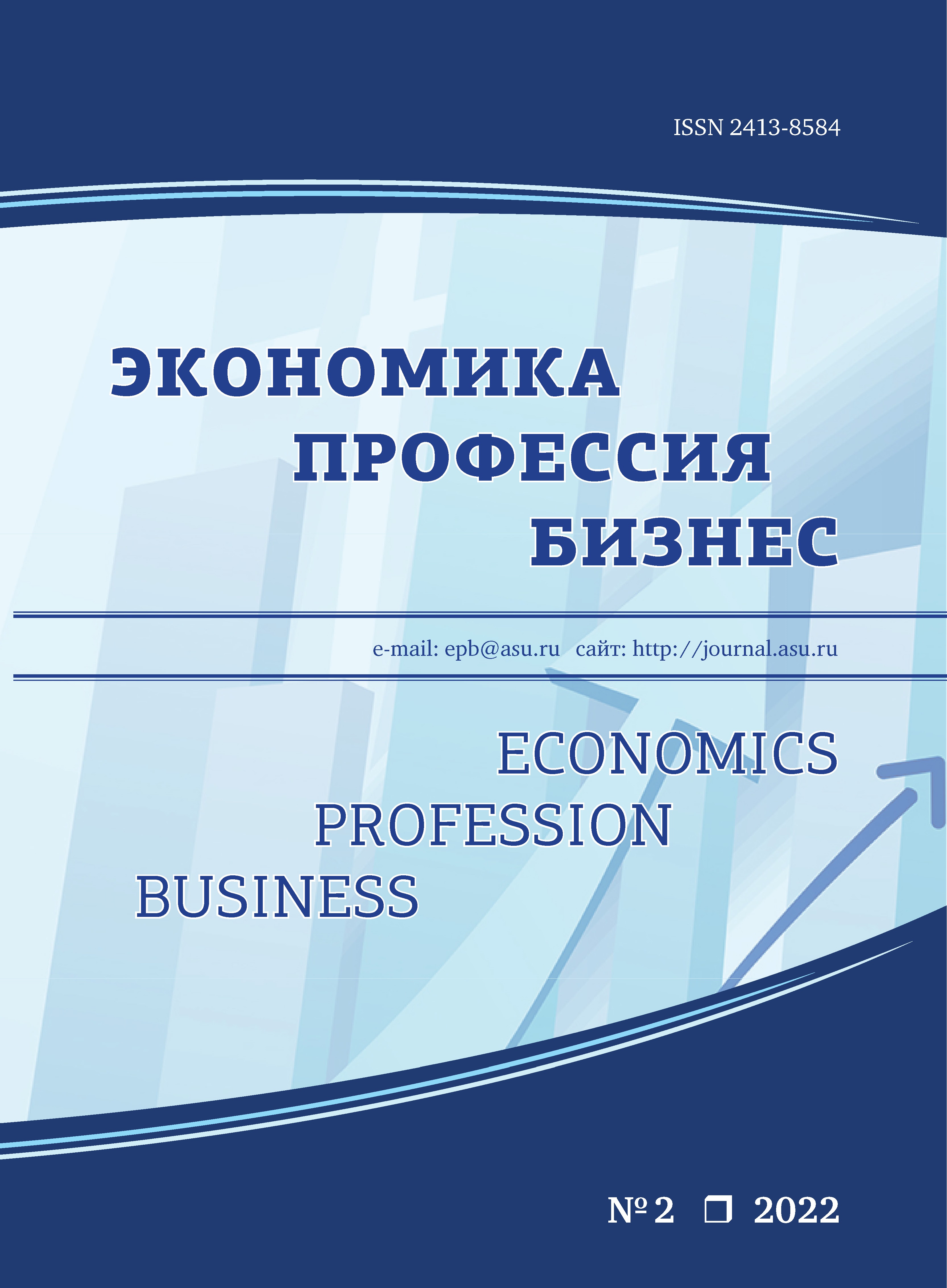DEPOPULATION OF THE POPULATION OF SIBERIA IN THE LIGHT OF THE RESETTLEMENT PROBLEM IN RUSSIA
УДК 332.1:314.7
Abstract
Understanding the problem of depopulation in Siberia prompted the author to study the current demographic situation in the Siberian Federal District and the factors that determined it. The comparative analysis results of statistical information for individual regions of the Siberian Federal District allow us to speak of the so-called «Western drift», the result of which is the pulling of the country’s population to the central part of Russia, which exacerbates the resettlement problem. The dynamics of demographic processes in Siberia is characterized by a significant decline of the population and an increase in the demographic burden, which acts as a serious limiter on the potential for the reproduction of the population in Siberian region in future, contributing to socio-economic stagnation. Clearly realizing that the reasons for the population decline in Siberian Federal District depend on the socio-economic situation, the author focuses on studying the dynamics of the ratio of cash income and wages in the Siberian regions with the average Russian ones, showing that the disproportions that have existed for many years are not decreasing, but growing. As one of the reasons for the current situation the author considers the polarity of views of Russian power elite representatives on the resettlement problem.
Downloads
Metrics
References
Шойгу предложил построить в Сибири города-миллионники и перенести столицу. URL: https://www.rbc.ru/politics/05/08/2021/610c0dc49a79475818b2d7f0 (дата обращения: 12.01.2022).
Границы и география Сибири. URL: http://сибирь-инфо.рф/content/19 (дата обращения: 20.01.2022).
Асканова О. В. Региональная дифференциация и стратегия пространственного развития России // Вестник Алтайской академии экономики и права. 2021. № 4 (часть 2) С. 157-165.
Асканова О. В. Социально-экономическое положение Алтайского края в свете проблем регионального неравенства // Проблемы и перспективы развития экономики и менеджмента в России и за рубежом: материалы двенадцатой международной научно-практической конференции. Рубцовск, 2020. С. 85-94.
Асканова О. В. Проблемы подготовки и закрепления управленческих кадров в Алтайском крае в условиях некомпенсируемой межрегиональной миграции // Экономическое развитие региона: управление, инновации, подготовка кадров: материалы V Международного экономического форума / под ред. д.э.н. С. В. Лобовой, д.э.н. С. Н. Бочарова. Барнаул, 2018. С. 15-27.
Регионы России. Социально-экономические показатели. 2006, 2016, 2021 // Официальный сайт Федеральной службы государственной статистики. URL: https://rosstat.gov.ru/folder/210/document/13204 (дата обращения: 20.12.2021).
Бедные вы, уйду я от вас. URL: https://www.kommersant.ru/doc/4793401 (дата обращения: 28.02.2022).
Кудрин: России необходимо создать 20 крупнейших агломераций. URL: https://tass.ru/pmef-2017/articles/4308990 (дата обращения: 25.02.2022).
Собянин рассказал о 15 млн «лишних» россиян. URL: https://www.rbc.ru/politics/25/11/2017/5a19830a9a7947c5662c64fc (дата обращения: 02.03.2022).
Володин призвал кабмин поддержать регионы с высокой убылью населения. URL: https://tass.ru/ekonomika/9784167 (дата обращения: 12.02.2022).
REFERENCES
Shoigu suggested building million-plus cities in Siberia and relocating the capital. URL: https://www.rbc.ru/politics/05/08/2021/610c0dc49a79475818b2d7f0 (date of access: 12.01.2022).
Borders and geography of Siberia. URL: http://сибирь-инфо.рф/content/19 (date of access: 20.01.2022).
Askanova O. V. Regional differentiation and strategy of spatial development of Russia // Bulletin of the Altai Academy of Economics and Law. 2021. No. 4 (part 2). Pp. 157-165.
Askanova O. V. Socio-economic situation of the Altai Territory in the light of the problems of regional inequality // Problems and prospects for the development of economics and management in Russia and abroad: materials of the twelfth international scientific and practical conference. Rubtsovsk, 2020. Pp. 85-94.
Askanova O. V. Problems of training and retaining managerial personnel in the Altai Territory in conditions of uncompensated interregional migration // Economic development of the region: management, innovation, training: materials of the V International Economic Forum / ed. Dan. S. V. Lobovoy, Doctor of Economics S. N. Bocharov. Barnaul, 2018, Pp. 15-27.
Regions of Russia. Socio-economic indicators. 2006, 2016, 2021. Official website of the Federal State Statistics Service. URL: https://rosstat.gov.ru/folder/210/document/13204 (date of access: 20.12.2021).
Poor you, I will leave you. Available at: https://www.kommersant.ru/doc/4793401 (date of access: 28.02.2022).
Kudrin: Russia needs to create 20 largest agglomerations. URL: https://tass.ru/pmef-2017/articles/4308990 (date of access: 25.02.2022).
Sobyanin told about 15 million «extra» Russians. URL: https://www.rbc.ru/politics/25/11/2017/5a19830a9a7947c5662c64fc (date of access: 02.03.2022).
Volodin urged the Cabinet of Ministers to support regions with a high population decline. URL: https://tass.ru/ekonomika/9784167 (date of access: 12.02.2022).
Copyright (c) 2022 Оксана Владимировна Асканова

This work is licensed under a Creative Commons Attribution 4.0 International License.
Economics Profession Business is a golden publisher, as we allow self-archiving, but most importantly we are fully transparent about your rights.
Authors may present and discuss their findings ahead of publication: at biological or scientific conferences, on preprint servers, in public databases, and in blogs, wikis, tweets, and other informal communication channels.
Economics Profession Business (EPB) allows authors to deposit manuscripts (currently under review or those for intended submission to EPB) in non-commercial, pre-print servers such as ArXiv.
Authors who publish with this journal agree to the following terms:
- Authors retain copyright and grant the journal right of first publication with the work simultaneously licensed under a Creative Commons Attribution License that allows others to share the work with an acknowledgement of the work's authorship and initial publication in this journal.
- Authors are able to enter into separate, additional contractual arrangements for the non-exclusive distribution of the journal's published version of the work (e.g., post it to an institutional repository or publish it in a book), with an acknowledgement of its initial publication in this journal.
- Authors are permitted and encouraged to post their work online (e.g., in institutional repositories or on their website) prior to and during the submission process, as it can lead to productive exchanges, as well as earlier and greater citation of published work (See The Effect of Open Access).









